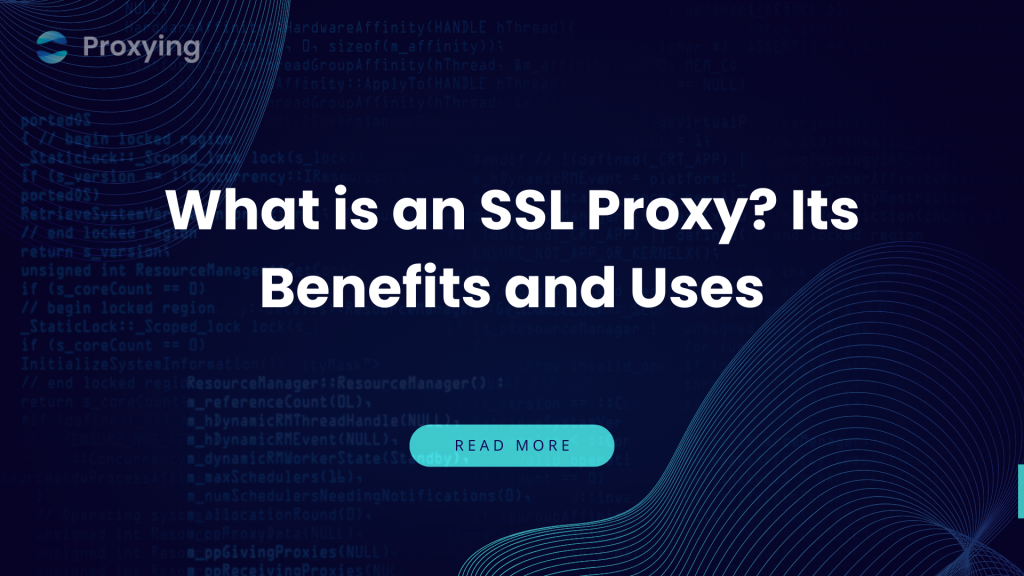The internet has become an integral part of our lives, but it also poses a risk of data exploitation online. Therefore, protecting yourself and your information while browsing is important. To achieve this, we often change our IP addresses constantly by using proxies.
So far, you have learned about the two major types of proxies: residential and datacenter proxies. But in this article, we will learn what is an SSL proxy and its benefits.
An SSL proxy belongs to a group of proxies indicated by the protocol used to connect online, like a SOCKS5 proxy.
What is an SSL Proxy?
SSL stands for Secure Socket Layer. An SSL proxy is a proxy server that provides a secure connection between the client and the server, protecting the data transmitted over the internet, such as passwords, credit card numbers, and other personal information. It encrypts the data before sending it to the server, preventing anyone from retrieving it.
Note: SSL proxy is also known as an HTTPS proxy, which stands for Hypertext Transfer Protocol over SSL. To put it simply, the HTTPS proxy server is a proxy using the HTTP protocol over SSL.
The HTTPS protocol is the most commonly used for most websites and online services. This is because it provides a much higher degree of privacy and security.
How does SSL Proxy Work?
As already mentioned, HTTP proxy servers use SSL to encrypt the data between the transferred endpoints. The proxy acts as an intermediary between the client and the server, allowing it to inspect the requests and responses. The SSL proxy also authenticates the server to the clients, verifying that it is a real server the client is trying to connect to, not some fake imposter.
Additionally, SSL certificates use end-to-end encryption, making data leaks and hacking whiel data is being transferred meaningless as this information is encrypted and hackers don’t have the necessary keys to read it.
Benefits of SSL Proxy
The benefits of using an SSL proxy are:
Enhanced Security
SSL proxies encrypt the data between your device and the server, protecting personal information and data from hackers and other cybercriminals.
The process uses a technique called handshake, as your device and the server exchange digital certificates and encryption keys before any data is transmitted. Once the secure network is established, data is encrypted and can only be accessed by intended recipient.
Privacy Protection
By changing your IPs constantly and encrypting your data, SSL makes it harder to track your online activity by hackers on websites. As you connect to a website through an SSL proxy, your data is scrambled into unreadable text.
An SSL proxy hides your IP address by routing your requests through different proxy servers.
Data Integrity
Data encrypted by SSL proxies is harder to tamper with or alter during transmission as it uses end-to-end encryption. The hackers would not have the necessary keys to decrypt the stolen data.
Prevention Against MITM Attacks
Compared to the HTTPS protocol, the older HTTP provides no encryption for data being transmitted. This makes your data vulnerable to hackers. They attack the data while it is being transferred. This attack is called a man-in-the-middle (MITM) attack. According to IBM’s X-Force, these attacks are no joke.
SSL proxies reduce the risk of MITM attacks since all data being transmitted is encrypted, and stolen data will not make any sense as it will be scrambled code.
Improved Anonymity
SSL proxies provide an extra layer of anonymity by masking your IP address and encrypting your traffic compared to other proxies. Although HTTP proxies provide reasonable anonymity, SSL provides an extra layer of security, reducing the risk of identity leak from hacked data.
Increased Control
SSL proxies work as both a shield and a command centre, giving you full control over your internet experience. They give you a full range of functionalities, blocking suspicious websites, filtering out unnecessary ads and malware, and choosing a specific country server for better performance.
Uses Of SSL Proxies
As it is a proxy so it has the same type of uses as other proxies, with just a security improvement. The uses include:
Web Scraping
SSL proxies are used to access websites that require a secure connection and for webscraping. Since they encrypt the request and data between the client and the server, requests seem more like real browsing behavior. This makes it harder for websites to detect and block automated bots.
Using an SSL proxy, web scraping bots can access the HTTPS websites that are full of valuable data. If you want to know more about web scraping, explore our guide “What is Web Scraping” for deeper insights.
Bypassing Geo-Restrictions
Many websites restrict access to data based on the location. SSL proxies allow you to access this content by routing your request through servers in different countries.
Ad Verification
In digital marketing, users need to confirm that their ads appear in every country and across multiple platforms. SSL proxies allow users to check their ads from different geo-locations. By this, they can detect any errors, verify ad quality, and ensure that it is running on every social media platform. Proxying helps businesses to achieve this by providing reliable SSL proxies that make ad verification across different regions simple and effective
Managing Social Media Accounts
For digital marketers, influencers, and agencies, handling and making social media accounts from the same IP or a single device can lead to account suspensions. SSL proxies solve this by routing each request through a unique and encrypted IP address, making it appear more human.
Brand Protection
Companies face constant challenges of getting hacked, fake sellers, and copyright issues. SSL proxies allow businesses to monitor their accounts and websites more anonymously, as their IP address is constantly changing. It increases the network security, filters spam emails, and helps in monitoring internet usage. Proxying allows companies to monitor their brand by providing effective SSL proxies.
Summary
SSL proxy is a go-to choice for businesses when it comes to protecting their data and securing their online activity, and much more. Proxying provides residential proxies, which are used to communicate with websites via HTTPS, ensuring the highest level of security and privacy.




